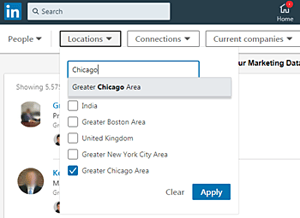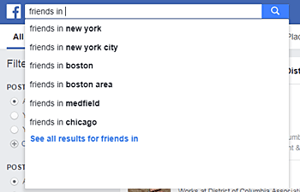Maybe your spouse got an irresistible job offer in a new city. Or you’ve decided you want to live somewhere with warmer, sunnier weather. These are just a few of the reasons you may one day find yourself looking for a job in a location other than where you are currently residing.
It is more challenging to find a new position before you’ve physically relocated, but there are many ways to make it easier. By building your local network and researching the target market, you’ll become known among decision makers and adapt more quickly to the area’s culture.
Here are 10 tips:
1. Ask friends and family who THEY know.
If you know even one person with a connection to your new location, it’s worth asking for potential introductions. Even if they’re not in your field, don't discount anyone! Job leads can come from the most unlikely of places. Start with friends, family, and professional colleagues and branch out from there.
2. Use LinkedIn to determine who YOU know.
 Facilitating professional connections by location is one of the things LinkedIn does best. Post a status update about your plans to move to strike up conversations with people currently living and working in your target market. Under "My Network" you can search for people by location and by employer (current and previous). You can send your 1st level connections a direct message.
Facilitating professional connections by location is one of the things LinkedIn does best. Post a status update about your plans to move to strike up conversations with people currently living and working in your target market. Under "My Network" you can search for people by location and by employer (current and previous). You can send your 1st level connections a direct message.
Try to move the resulting online conversations about your desired industry and role to one-on-one phone calls, when appropriate, and don't be afraid to ask for favors, such as introductions to potential employers or additional networking contacts. People really do like to help when they are asked and when they are clear on exactly what type of help you need.
3. Don’t ignore the other social media tools.
 Even though other platforms aren’t as career-oriented as LinkedIn, you may find on twitter or Facebook that you have regional contacts who can put you in touch with people in the companies that interest you. On Facebook, in the search box you can type in “Friends who live in” or Friends who live near”, then add the city to which you’re moving to generate a list. Connect with a direct message, move toward a short phone conversation, and ask for help.
Even though other platforms aren’t as career-oriented as LinkedIn, you may find on twitter or Facebook that you have regional contacts who can put you in touch with people in the companies that interest you. On Facebook, in the search box you can type in “Friends who live in” or Friends who live near”, then add the city to which you’re moving to generate a list. Connect with a direct message, move toward a short phone conversation, and ask for help.
4. Join the local chapter of an industry or professional association.
By becoming a member of an organization focused on your industry or profession in your new location, you instantly gain access to a new, targeted network. Start gaining visibility and contacts by contributing to their LinkedIn group, or attending one of their regional events, if possible. An added benefit is that you can add this affiliation to your resume, so a hiring manager will see your local connection. One organization to consider is Society for Information Management (SIM), a professional network of IT leaders with 42 chapters across the U.S.
5. Check with your college’s alumni group.
Your college or university probably coordinates regional events where you can meet or reconnect with fellow graduates. Most have directories or online communities you can tap into to find alumni that live in the city you plan to relocate to. Identify a few people who work at local companies that interest you and ask to schedule a call.
6. Take a a week to visit your target city.
While online interactions and phone calls are excellent ways to start building a relationship, nothing can take the place of a face-to-face meetings. Spend some time on the ground in your target city. Meet with those you've connected with through the above methods, and while you’re there, try to attend an industry conference, an alumni meetup, a networking event or a vendor-sponsored event. CIO Perspectives is a one-day conference for IT leaders produced by IDG/CIO and held in nine different major cities across the U.S. throughout the year.
7. Read your target city's news and business journals.
Learn the names of leaders and gain an understanding of the local employment landscape. You’ll be able to use this information to identify places where you might like to work (and NOT work!). For example, if you were looking to move to Dallas, Texas, you could read the Dallas Business Journal. In fact, the “Biz Journals” exist for no less than 43 markets. Crain’s publishes local business journals in 36 major markets.
8. When talking with people, be on the lookout for culture differences.
Workplace culture can vary greatly depending on an organization’s location. For example, a “business casual” dress code can mean different things based on the company’s location – and weather. Observe others carefully and consider asking people how they would define their city’s overall business culture.
9. Position your resume and cover letter to minimize relocation concerns.
Consider leaving your address off of the resume. This way, you won’t be eliminated from consideration based solely on where you live. Another option is to face the issue head on and mention in your cover letter that you’re planning to relocate. If you have the details, you can also state exactly when you’re expected to be living in the new city.
10. Engage with recruiters.
Often, recruiters source for positions in a certain industry instead of a regional location. Let any you’ve been in touch with over the years know where you’re looking to move.
Of course, one must always use discretion when currently employed. Otherwise, acting and speaking “as if” you’re already in your new city, both socially and professionally, will land you a job there more quickly.

Written by Charlotte Weeks
Charlotte Weeks is President of Weeks Career Service, Inc. She specializes in providing C-level executives, association executives, executive directors, VP/senior-level professionals, and aspiring executives with comprehensive career coaching services and high-ROI resumes.



